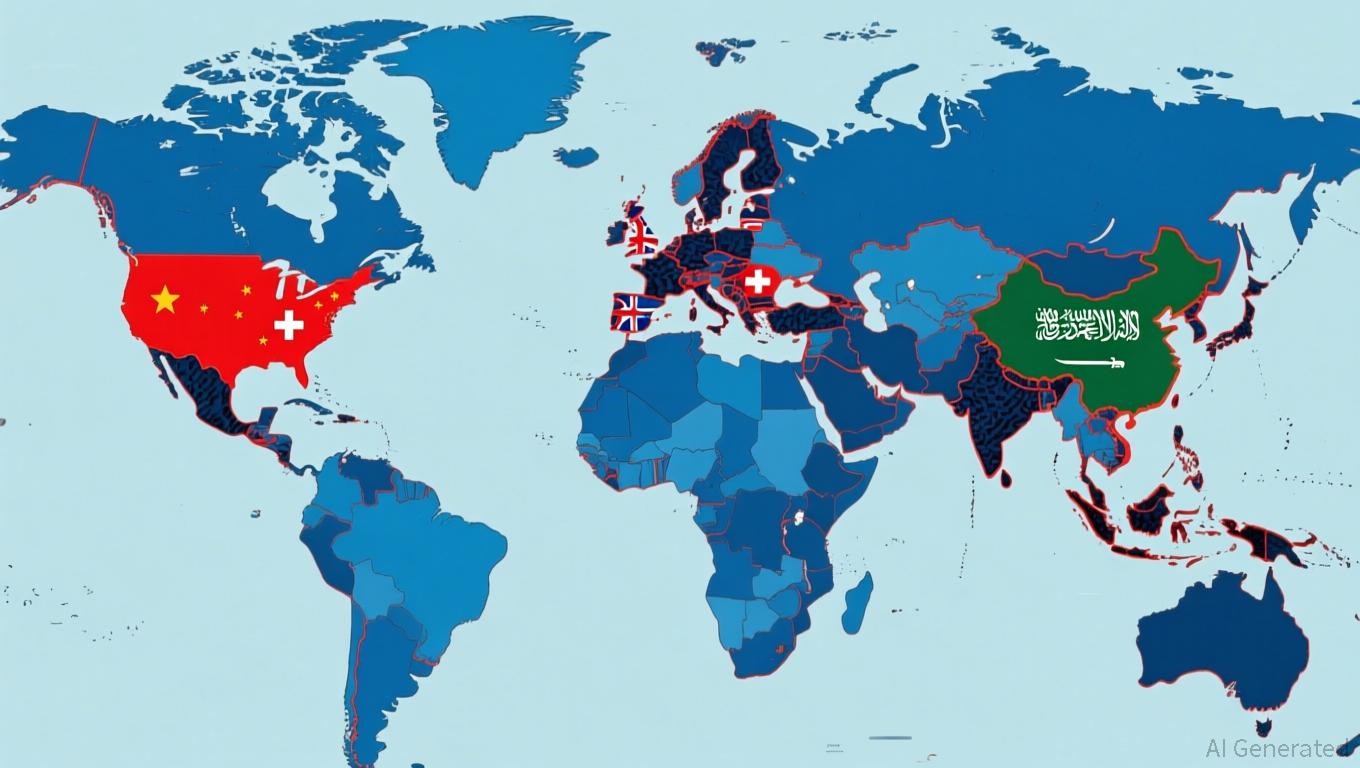BigBear.ai's Shares Soar 300%, but Financial Concerns Raise Questions About Its Valuation
- BigBear.ai's stock surged 300% in 2025 driven by defense AI contracts and partnerships like Tsecond Inc.'s rugged hardware integration. - Despite high-profile deployments (e.g., O'Hare Airport biometric system), Q2 2025 revenue fell 18% and net losses widened to $228.6M. - Analysts remain divided: some cite OB3 funding and $390M cash reserves as bullish, while others warn valuation (13× forward sales) exceeds fundamentals. - Competition from Palantir and C3.ai, plus reliance on $380M contract backlog, ra
In 2025, BigBear.ai's stock price has soared by more than 300%, driven by a surge in defense-related AI contracts and frequent comparisons to Palantir Technologies. Despite this impressive rally, experts remain divided on whether the momentum can last. The stock, which ended at $7.05 on October 24, has experienced significant swings, including a 22% jump in early October after announcing a collaboration with Tsecond Inc., as reported by a
The upward trend in the stock has also been supported by notable rollouts of its veriScan biometric system, such as at Chicago O'Hare International Airport, where it cut the time for processing international travelers from one minute to just ten seconds. These achievements coincide with increased federal spending on AI, especially the $300+ billion "One Big Beautiful Bill" (OB3) for defense and homeland security. Yet, BigBear's financial results present a mixed picture. In the second quarter of 2025, revenue dropped 18% year-over-year to $32.5 million, and a net loss of $228.6 million—mainly due to accounting adjustments—highlighted ongoing operational issues. The company has reduced its full-year revenue outlook to between $125 million and $140 million and has retracted its profit projections because of project setbacks.

There is no consensus among analysts regarding the stock's valuation. H.C. Wainwright has raised its price target to $8, pointing to a "stronger balance sheet" and benefits from OB3, while others caution that the stock is already valued at 13 times its projected sales, suggesting that much optimism is already reflected in the price. Simply Wall St's models estimate a fair value of $5.83, which is about 20% below the current price. At the same time, Seeking Alpha's review warns that BigBear's underlying business—especially its flat revenue growth—does not support the recent surge, describing the stock as "a valuation rally amid vanishing fundamentals", as stated in a
BigBear is up against tough competition from established names like Palantir and C3.ai. While these companies lead in defense and enterprise AI, BigBear's $30 million in quarterly sales is dwarfed by Palantir's multi-billion dollar revenues. C3.ai, which recently posted a 19% drop in revenue and a $116.7 million net loss, is also dealing with leadership changes and sales challenges, according to a
The next few weeks will be pivotal. The upcoming earnings report on November 10 may decide if the stock continues to climb or faces a pullback due to missed expectations. Optimists believe that BigBear's $390 million in cash and its strategic role in defense AI could drive long-term gains, while skeptics highlight the risks of depending on a handful of large contracts and the uncertainty of scaling its business.
As competition intensifies in the AI defense industry, BigBear.ai represents a high-risk wager on innovation versus financial fundamentals—a story that could shape its path in the near future.
Disclaimer: The content of this article solely reflects the author's opinion and does not represent the platform in any capacity. This article is not intended to serve as a reference for making investment decisions.
You may also like
Switzerland Delays Crypto Information Exchange Pending International Coordination
- Switzerland delays crypto tax data sharing with foreign nations until 2027, citing unresolved CARF partner agreements. - The OECD's 2022 framework requires member states to exchange crypto account details, but 75 countries including the EU and UK face implementation challenges. - Transitional measures ease compliance burdens for Swiss crypto firms while awaiting finalized international data-sharing protocols. - Major economies like the U.S., China, and Saudi Arabia remain outside CARF due to non-complian

Bitcoin Updates: SGX Addresses Offshore Perp Shortfall as Bitcoin Decline Increases Demand for Hedging
- SGX launched Bitcoin and Ethereum perpetual futures, becoming a first-mover in regulated onshore crypto derivatives to meet institutional demand. - The $187B/year perp market, dominated by Asia, now gains a regulated alternative to offshore platforms with SGX's 22.5-hour trading window. - Perps enable hedging during Bitcoin's 2025 downturn, with SGX's margin-call system prioritizing investor protection over instant liquidations. - Regulatory caution limits access to accredited investors, aligning with gl

Bitcoin News Update: Institutional ETF Adjustments Challenge Key Bitcoin Support Thresholds
- Analysts warn Bitcoin faces 25% drop risk if key support levels fail amid shifting institutional ETF dynamics. - Texas's $5M IBIT purchase highlights growing government interest, but ETFs fall short of direct BTC ownership criteria. - Technical analysis shows Bitcoin trapped in a broadening wedge pattern, with breakdown below $80,000 risking $53k decline. - Institutional rebalancing sees $66M IBIT outflows vs. $171M FBTC inflows, signaling tactical ETF rotation over accumulation. - Abu Dhabi's $238M ETF

XRP News Today: IMF Cautions That Rapid Tokenized Markets Could Intensify Crashes in the Absence of Regulation
- IMF warned tokenized markets like XRP could worsen flash crashes without regulation, citing risks from decentralized systems lacking traditional safeguards. - Report acknowledged tokenization's potential to cut cross-border payment costs but highlighted volatility risks from rapid liquidity loss seen in crypto markets. - SEC's approval of crypto ETFs signals growing institutional acceptance, though regulators emphasize oversight frameworks to mitigate systemic risks. - IMF proposed a global digital marke
